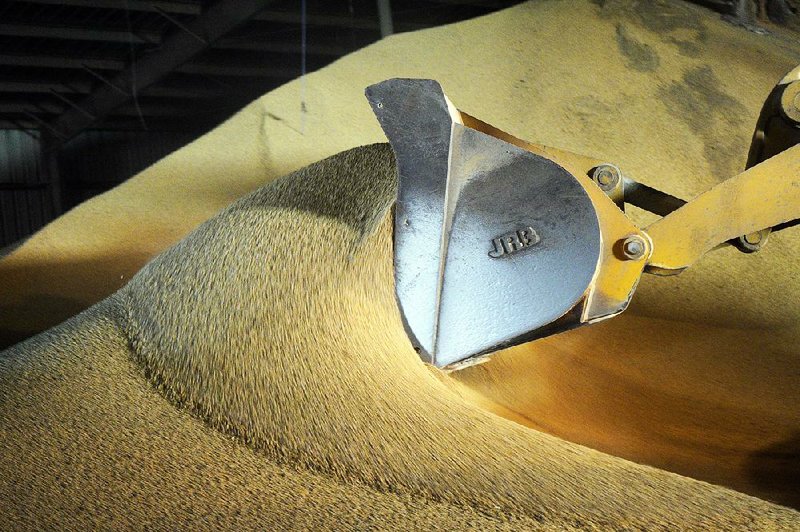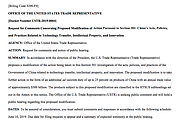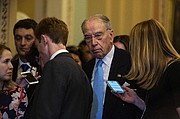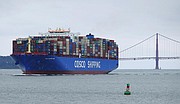WASHINGTON -- President Donald Trump on Tuesday rushed to placate farmers and Senate Republicans about his trade war with China, with lawmakers now considering a package of fresh bailout funds.
Farmers, lawmakers, business executives, and global investors are looking to Trump for clues on how far he intends to take the trade showdown with China. On Monday, Trump suggested the standoff could last years and lead to structural changes in the global economy.
On Tuesday, Trump offered conflicting forecasts, musing that a deal could come in the next month but also predicting an economic battle with Beijing.
In one Twitter post, he said he would sign off on a deal "when the time was right," but in another post he called for using the U.S. Federal Reserve to thwart China's economic agenda.
"In any event, China wants a deal!" Trump wrote.
The office of the U.S. trade representative on Monday published a list of 3,805 Chinese-made products that could be hit for the first time with 25% tariffs. The list includes things like tuna, pacifiers, saw blades, flashlights, door chimes, billiard balls and golf carts. It excludes pharmaceuticals and rare-earth minerals used in electronics and batteries.
The agency will take public comments and hold a hearing on the proposed tariffs June 17.
In its earlier rounds of tariffs on Chinese products, the administration tried to limit the effect on American consumers by focusing on so-called intermediate goods -- imported components that U.S. companies use to make finished products.
The trade war that began last summer has already hurt farmers, despite $11 billion in relief payments that were doled out last year by the federal government. The personal income of farmers declined by $11.8 billion through the first three months of 2019, according to the U.S. Commerce Department. A similar pace of decline is expected in the coming months, according to the Federal Reserve Bank of Kansas City.
"The domestic stress caused by the administration's trade policy is nowhere more evident than in the agricultural sector," said Joseph Brusuelas, chief economist at the consultant RSM. "Should the current policy pathway not be changed, the farm sector is going to experience the greatest downturn since the late 1980s, driven by widespread bankruptcies and consolidation."
U.S. companies exported $9.3 billion in agriculture products to China last year, making it the fourth largest market. The biggest exports were soybeans, cotton, hides and skins, pork, and coarse grains such as corn.
The mounting concern from farmers and business groups showed signs of bleeding into the 2020 presidential campaign. Trump has attacked former Vice President Joe Biden, a Democratic contender for the nomination, and alleged that Democrats didn't act forcefully enough to counter China in past decades. But Biden on Monday told the radio station WMUR that Trump was creating collateral damage with his blunt trade agenda, which has relied on costly tariffs that U.S. companies must pay to bring in Chinese products.
"The American worker is getting killed by this," Biden said. "The American farmers are getting killed."
In a sign of the concern for lawmakers, some Republican leaders are looking at a way to amend an unrelated disaster-relief package to free up billions of dollars in rescue money for U.S. farmers.
Trump has alleged for years that China rips off U.S. businesses and consumers by stealing intellectual property and rigs its currency to flood the U.S. with cheap imports. He has also complained that the U.S. imports $500 billion more in Chinese goods than it exports to Beijing, an imbalance he says is unfair.
To force the Chinese government to change its behavior, he has imposed steep tariffs on $250 billion in Chinese goods and threatened to extend these import penalties to more than $300 billion in additional products.
China has responded in two ways, both by trying to negotiate with him to stop the tariffs and by imposing import penalties on U.S. exports like soybeans and other items. This has led U.S. farmers to complain they are being caught in the middle of the standoff, putting pressure on lawmakers to intervene.
Senate Republicans on Tuesday were dealing with complaints from powerful farm groups.
Sen. Pat Roberts, R-Kan., on Tuesday was asked by a reporter about the level of patience among farmers with the trade standoff and he held his thumb and index finger an inch apart.
Sen. John Cornyn, R-Texas, said the White House's approach to helping farmers so far was "inadequate" and that more needed to be done, and soon.
Senate Finance Committee Chairman Charles Grassley, R-Iowa, said he planned to write a letter to Trump to explain the concerns of farmers because he felt the argument he had repeatedly made to the president in person was not registering.
"I'm not sure if you talk to him face to face he hears everything you say," said Grassley, who has emerged as one of Trump's chief critics on the administration's trade approach in recent weeks.
Trump last year directed the U.S. Department of Agriculture to spend $12 billion on programs to help U.S. farmers affected by the trade war, and he has suggested he will send another $15 billion to farmers this year. But lawmakers and farm groups are confused as to how this would work, and Trump on Monday said the plan was still being "devised."
Soybean farmers and pork producers received much of the focus last year, but a widening range of farmers and fishermen have complained they are being affected. Lawmakers are now trying to decide whether they can find ways to help cherry producers, corn growers, lobstermen, and others.
On Tuesday, Trump wrote on Twitter that "our great Patriot Farmers will be one of the biggest beneficiaries" of his trade policies. He said that would come either from China buying more U.S. products or the U.S. government making up the difference.
One idea under consideration would be an expansion of bailout funds from the Commodity Credit Corp., a division of the Agriculture Department.
Trump used that program to help farmers last year. But Chinese officials signaled Monday that they planned to dramatically increase restrictions on U.S. imports, including agricultural products, in retaliation for new tariffs imposed by Trump.
Sen. John Hoeven, R-N.D., chairman of the agriculture appropriations subcommittee, said U.S. officials would use a type of "market facilitation payment" but also make direct purchases on behalf of the government from U.S. producers.
He did not specify how much money would be directed to these initiatives, but he said some of it would be paid for with money that the Treasury Department brings in through tariffs on Chinese imports.
Farm groups are among the most politically powerful in the United States, particularly in the Senate. Trump has appeared unmoved by many of the business groups who have complained about his trade approach, but he has frequently promised to appease farmers.
Information for this article was contributed by Damian Paletta, Erica Werner and Taylor Telford of The Washington Post; and by Paul Wiseman, Joyce M. Rosenberg and Blake Nicholson of The Associated Press.
A Section on 05/15/2019



